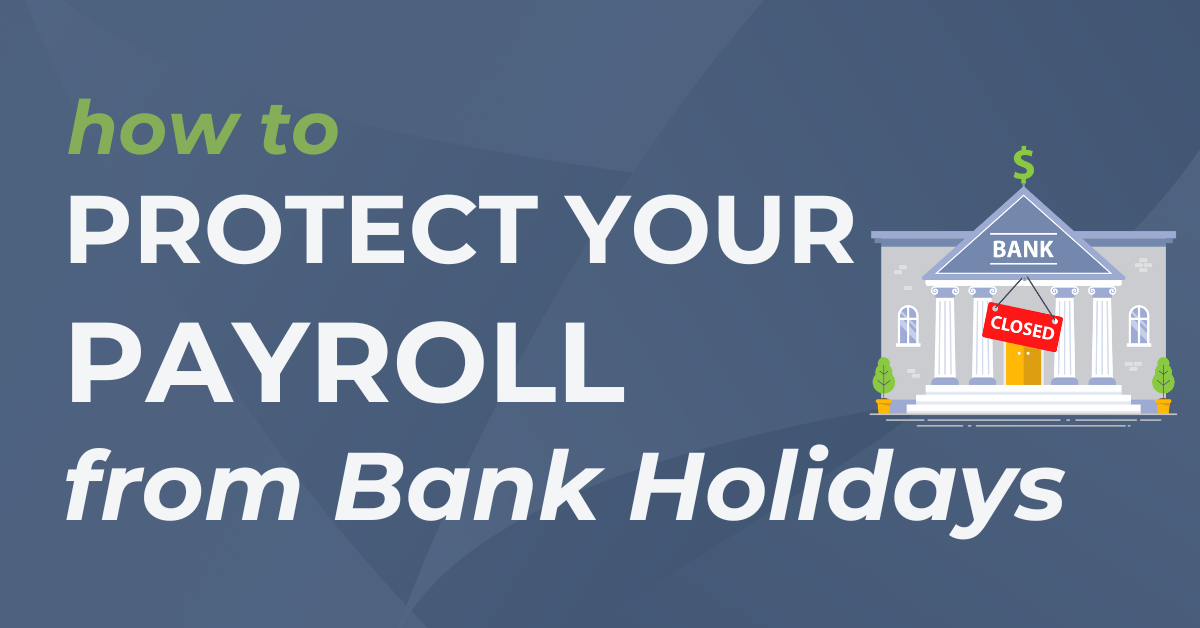It’s one thing to miss a payroll deadline—but when your team depends on that paycheck, the stakes are much higher.
Are you prepared to handle the pressure when a bank holiday throws off your schedule?
Or will you be left scrambling, with employees missing pay and sending urgent messages your way?
This article shows you how to keep payroll running smoothly, even when bank holidays threaten to disrupt your routine. We’ll cover proactive scheduling tips, communication strategies to keep everyone informed, and practical steps to make sure paychecks arrive on time, holiday or not.
How Does a Bank Holiday Affect Small Business Pay Schedule?
The first step in planning for bank holidays is understanding why they impact your pay schedule.
For many businesses, payroll relies on the Automated Clearing House (ACH) network, which processes direct deposits into employee accounts. However, ACH transactions have strict timing requirements. If your payroll date falls on a non-business day, like a bank holiday, or if there’s not enough time for funds to clear, your bank may reject the transaction.
Most banks require ACH files to be submitted by early or mid-afternoon to process payments the following day. For example, if payday is Friday, you typically need to submit the ACH file by the bank’s Thursday cutoff time.

How Bank Holidays Complicate Payroll
Now, let's talk about those pesky bank holidays that can throw off even the most well-planned payroll schedules.
If a holiday falls on a Friday, for instance, Friday can no longer be payday. Instead, it’s standard practice to move the pay date to the preceding business day. However, this adjustment can disrupt your routine if you’re used to processing payroll on Wednesday afternoons. A surprise Friday holiday might mean your employees won’t see their pay until after the weekend unless you plan ahead.

For example, if you run payroll on a semi-monthly schedule—say on the 10th and 22nd— you might assume that submitting payroll on the 8th and 20th would be enough. But if the 22nd falls on a Tuesday following a Monday holiday, your cutoff will shift, and you may miss the window to ensure timely payment.

Running Payroll Before the Pay Period Ends
Bank holidays create different challenges depending on your pay frequency, but one scenario is especially problematic: when a holiday forces you to process payroll before the pay period ends.
In these cases, you may need to estimate pay, particularly for hourly employees, which can lead to inaccuracies. Adjusting payroll in advance also means double-checking compliance with federal and state labor laws.
.png?width=594&height=133&name=How%20direct%20deposit%20work%20(3).png)
Building a Payroll Buffer
To avoid these issues, it’s a best practice to establish a buffer of at least five days between the end of the pay period and payday. This buffer ensures that your cutoff day always falls after the pay period ends, allowing you time to process payroll accurately and legally.
Extending this buffer to six or seven days gives you additional flexibility, reducing last-minute stress and guaranteeing consistent paydays.
Once you’ve established this buffer, the most foolproof way to ensure your pay date remains unchanged is to process your payroll the day after your pay period ends. This approach guarantees that your pay period always concludes on the same day of the week (for weekly and bi-weekly payrolls) or day of the month (for semi-monthly and monthly payrolls).
A Bank Holiday Wake-Up Call for Employers
Bank holidays are a reminder that payroll is never static. Remember, there’s more than one way to handle payroll effectively and it’s essential to find the methods that align with your business and comply with labor laws.
Creating a buffer, planning for holiday shifts, and working with a payroll provider that aligns with your business’s needs will prevent payroll headaches and keep your team happy.
Missed paydays can lead to dissatisfaction and turnover. Don’t let a bank holiday throw you off course—take control and plan ahead.
Need help untangling your payroll process? Check out our article, You Have a Complicated Payroll – What Can You Do About It?




.png?width=594&height=133&name=How%20direct%20deposit%20work%20(3).png)